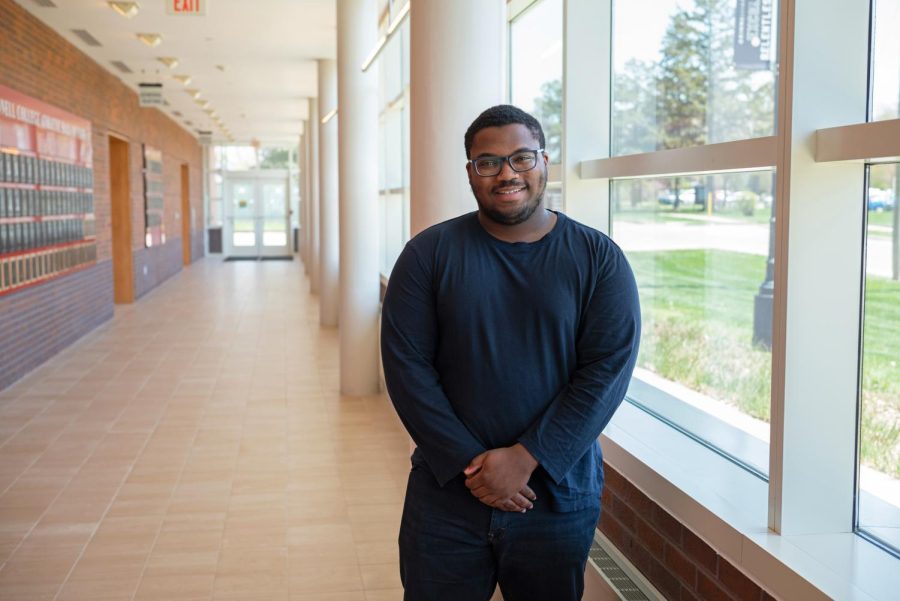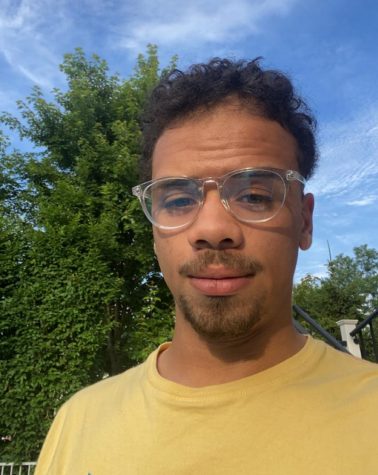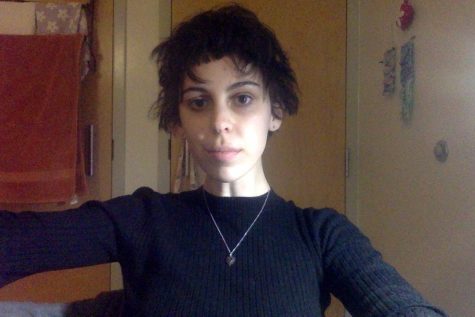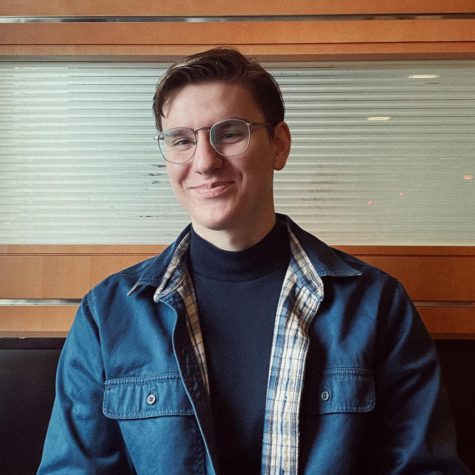Koffi Amegble
May 8, 2023

Koffi Amegble `23 is a graduating first-generation, low-income student and biology major. At Grinnell, Amegble developed himself personally and academically with the help of close friends and professors. Over his four years at Grinnell, Amegble had a plethora of experiences ranging from COVID-19 and online classes to learning how to lift weights and ask others for help.
Amegble was born in Togo and emigrated with his parents to the United States when he was three years old. Since arriving in the United States, Amegble and his family have moved several times, never staying in one location for more than three to four years at a time. He is the first of his family to attend college.
When Amegble arrived in Grinnell, he said that his low-income background played a role in how he felt he fit in amongst his peers.
“I can say at times, things feel uncomfortable given that you’re not always working with the same starting hand as a lot of people. So in some ways, you kind of feel like an outsider because you can’t always have the fanciest or the best resources,” Amegble said.
Amegble said that the Charles Benson Bear `39 Recreation and Athletic Center (Bear), specifically the weight room, is the space on campus that best reflects his time at Grinnell, in part because it is one of the first places where he felt “seen.”
Amegble had worked out a few times in his first year, but according to him, he “did not know what the heck” he was doing.
With the pandemic occurring during the second semester of his first year, and the personal protective equipment requirements, Amegble said that it was hard to work out consistently during that time.
“I remember after the pandemic we came back to campus and I was really struggling with self-image and just my overall health” Amegble said, “A few upperclassmen took me under their wing and got me into going [to the gym] consistently. “
Amegble became close friends with Seif Abdelaziz Emam `22 in his third year after he asked Emam for beginner exercises that he could do.
“I was really inspired by his physique and his work ethic. I noticed that despite having a stressful schedule and everything, he still managed to display peace within himself and also make time for priorities like lifting, and staying in shape and everything just for his own personal sanity,” Amegble said.
With Emam, Amegble began going consistently and making progress in his lifting form and self- confidence.
It was also at the Bear where Amegble said he learned to see failure in a different light than before.
“The Bear was the first place where I was like failure was kind of a good thing in a way, and so once I realized, ‘hey, I failed, the world didn’t explode,’ it wasn’t game over. I started realizing that meant, academically, it was kind of the same,” Amegble said.
Aside from the Bear, Amegble also had several professors and faculty who helped him throughout his time at Grinnell.
In his first year, Amegble said that he was struggling with personal issues and being able to keep up with coursework, which led to him being connected with Belinda Backous, assistant dean for academic success.
“Ever since then, I gradually started escaping from the emotions of that day and started living in the present again, and to this day, she and I are best friends,” Amegble said.
Also in his first year, Amegble joined the Minority Association of Premedical Students, a national organization that provides underrepresented groups with the experience they need to succeed in the professional medical field. He is currently a co-leader of this group at Grinnell, and he is also a part of the Black Students in Stem club and the Black Student Union.
In the second semester of his first year, the COVID pandemic led to Amegble going back home with his family. Amegble said that he speaks English better than his mother, so he would take on the responsibility of contacting the landlord for maintenance and other things.
“I wasn’t allowed to just be a student, I had to do tenant duties and stuff, too,” Amegble said.
Online classes also presented another challenge for Amegble — he never experienced in-person labs for his biology classes.
Amegble said that this led to him feeling uneasy about lab work in his third-year classes, but Charvann Bailey, assistant professor of biology, gave him space to learn and develop his lab skills while he was in her class.
“She was the one that kind of inspired me to continue staying in the biological sciences,” Amegble said.
Amegble has also collaborated with Bailey on cancer research for the last two summers through a Grinnell Mentored Advanced Project (MAP). Amegble said that Bailey also helped him get into a cancer research position at the University of Iowa during his summer MAP.
Upon graduation, Amegble will be returning to the University of Iowa to work with the research team he was a part of last summer.
When reflecting on his time at Grinnell, Amegble said, “I’m gonna really miss just that personalized, you know, relationships you can have with professors, and staff and students here at the College.”
Amegble said he is most proud of the fact that he did not give up even when he was not getting the grades he wanted and was stressed out.
“And so I took that [not getting the grades I wanted] as a sign of, like, maybe I wasn’t cut out for this place. But at the same time, I felt like because I was a first-gen, low-income I had to think about the image I’m setting for my sister.”
Amegble said that in his first two years, he would prioritize his grades over his health in an attempt to maintain a high GPA for grad school. His advice for underclassmen stems from his experience of this and the impact it had on his health.
“Never stop putting your health first. Design your schedule around a guaranteed time for [your] gym/wellness as opposed to seeing when you can fit in your wellness inside of your Grinnell schedule,” he said.




















































